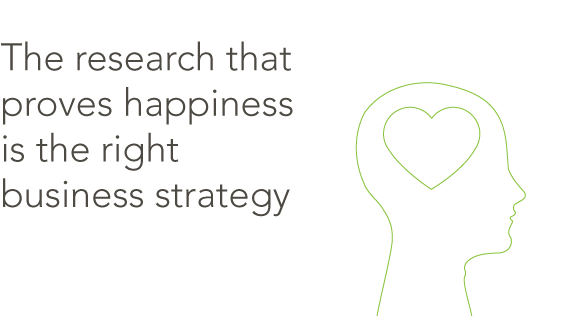The Science…

Most of us will probably take the view that a happy workforce is going to make for a happy organisation, and hence a more successful one; and for those in the commercial sector, a more profitable one, and so it’s good to know that there is loads of research out there that proves our instincts are spot on.
But often the question is asked: what comes first? Does profit follow happiness, or the other way round? Surely, if a business is making money, then a happy workforce will follow? Focus on the bottom line almost to the exclusion of all else, and all will be well? But the research tells us over and over again, that that approach is misguided.
So, is mastering those devilishly difficult ‘soft skills’ the foundations for success? The answer is an overwhelming Yes! But frustratingly, they’re not so easy to pin down as hard facts and figures. For instance, research diverts on what is the number one factor to increase happiness at work: some say it’s people having a sense of progress, others it’s about giving responsibility, others still that it’s to do with the qualities of their direct supervisor. Sykes Fairbairn will help you make sense of all of this, so please contact us, but in the meantime if you’re still not convinced that happy means success, consider some of the following research:
• “People who are happier at work are 10-50% more productive than when they are unhappy – they are more engaged, more creative, have better concentration” (Nic Marks of the New Economics Foundation)
• Engaged employees are 87 per cent less likely to leave the organisation than the disengaged. (Corporate Leadership Council 2004)
• 78% of engaged employees would recommend their company’s products or services, against 13 per cent of the disengaged (Gallup 2003).
• According to the 2010 research by Harvard University business administration professor Teresa M. Amabile and independent researcher Steven J. Kramer happy employees are more productive and collaborative: on employees’ best days they reported making progress in their work (76%) and being collaborative (53%). Those numbers plummeted to 25% and 43%, respectively, on days when employees felt unhappy.
• iOpener Institute for People and Performance’s empirical research, involving 9,000 people from around the world, revealed that employees who report being happiest at work stay twice as long in their jobs as their least happy colleagues, spend double their time at work focused on what they are paid to do, take ten times less sick leave and believe they are achieving their potential twice as much.



